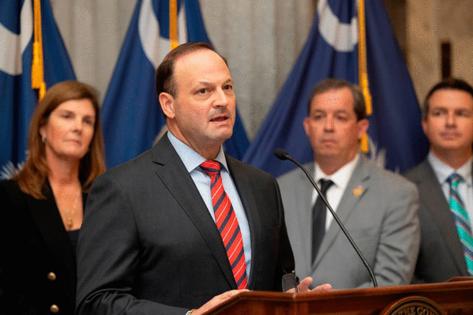Chinese app sits at the center of fentanyl epidemic, group of attorneys general says
Published in News & Features
CHARLOTTE, N.C. — At the center of the fentanyl crisis sits a Chinese messaging app, six attorneys general said in a letter to the encrypted platform Monday.
WeChat could face criminal charges for allowing dealers and money launderers to seamlessly funnel billions between Mexican cartels, Chinese money laundering organizations and U.S. dealers, said North Carolina Attorney General Jeff Jackson in Charlotte Monday.
Jackson and five other attorneys general in a published letter are demanding the company by June 11 describe “what steps, if any, WeChat has taken in response to (evidence) of WeChat being used to facilitate money laundering by fentanyl traffickers.”
Jackson posted the letter on his office’s website following the Charlotte news conference Monday. It also was signed by attorneys general from as far away as Colorado to as close as South Carolina.
The China-based app used by billions of people in China and nearly 20 million in the United States could face criminal charges under North Carolina’s new anti-money laundering law, public nuisance law or federal law, Jackson said.
When Jackson came into office last year, he said he quickly “started talking to state and federal law enforcement about fentanyl.”
“WeChat was just coming up left and right,” Jackson said in an interview with the Observer Monday.
Fentanyl trafficking has flooded Charlotte and the United States with the potent, deadly opioid often laced in common street drugs.
Charlotte-Mecklenburg Police Department Lt. Robert Sprauge, who joined the news conference with Jackson and South Carolina Attorney General Alan Wilson, said that Mecklenburg County saw 75 overdose deaths between January and April of last year. Of those, 86% were fentanyl-related.
Last week, North Carolina Gov. Josh Stein called for $2.5 million of the state budget to go toward drug investigators and prosecutors who can focus on fentanyl trafficking specifically.
Investigators continue to uncover multi-billion-dollar schemes that involve fentanyl traffickers linked to Mexican cartels and money launderers with Chinese leaders.
Evidence suggests that WeChat is complicit in trafficking schemes, Jackson said, and is “helping to bankroll the fentanyl epidemic.”
Duffel bags full of cash are a thing of the past, he said. To go after drug dealers fueling the fentanyl crisis, officers must look in the digital space, specifically on the encrypted messaging app. Recent court cases, according to the attorneys general letter, show that:
— “In 2021, money launderer Xizhi Li was convicted of running a transnational criminal network that used WeChat to coordinate bulk cash movements, linking Chinese financial operatives with cartel drug distributors.”
— “Anne Milgram, former administrator of the DEA, testified to Congress about ‘Operation Chem Capture,’ where eight companies and 12 individuals were indicted in 2023 for using encrypted messenger services, including WeChat, to facilitate the illegal sale of fentanyl precursor chemicals to the United States.”
— “Los Angeles-based associates of Mexico’s Sinaloa drug cartel and Chinese money laundering groups used WeChat to facilitate laundering fentanyl proceeds to the United States.”
— “And just last month, three members of an international money laundering organization were charged in federal court in South Carolina with utilizing WeChat and other messaging apps to facilitate their fentanyl money laundering activities.”
Jackson demanded answers in a letter he wrote and signed alongside Wilson and attorney generals from Colorado, Mississippi, New Hampshire and New Jersey. That’s three Democrats and three Republicans.
“I wanted it to be equal parts ... to demonstrate bipartisanship here,” Jackson said in an interview. “I also wanted geographical diversity, because fentanyl is poisoning people in every state in the country.”
_____
©2025 The Charlotte Observer. Visit charlotteobserver.com. Distributed by Tribune Content Agency, LLC.







Comments